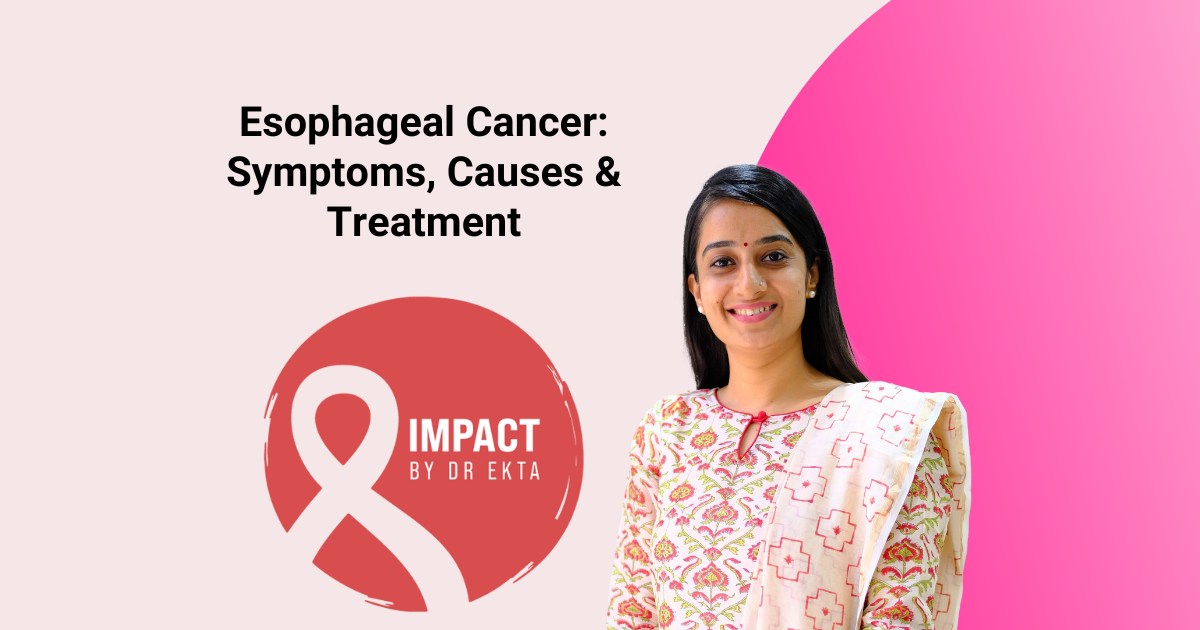Esophageal cancer is a serious condition that affects the esophagus, the tube that carries food from the mouth to the stomach. While it is not as common as other types of cancer, its symptoms often go unnoticed until the disease has progressed. Understanding the symptoms, causes, and treatment options can help in early detection and better management of the condition.
What is Esophageal Cancer?
Esophageal cancer develops when abnormal cells grow uncontrollably in the lining of the esophagus. There are two main types:
- Adenocarcinoma: This type usually develops in the lower part of the esophagus and is often linked to acid reflux and obesity.
- Squamous Cell Carcinoma: This occurs in the upper or middle part of the esophagus and is commonly associated with smoking and alcohol consumption.
Symptoms of Esophageal Cancer
Esophageal cancer may not cause symptoms in its early stages. However, as the disease progresses, individuals may experience:
- Difficulty Swallowing (Dysphagia): A persistent feeling of food getting stuck in the throat or chest.
- Unexplained Weight Loss: Sudden weight loss without changes in diet or physical activity.
- Persistent Heartburn or Acid Reflux: Chronic acid reflux may be a warning sign of esophageal damage.
- Chest Pain or Discomfort: Pain in the chest, often mistaken for heart-related issues.
- Hoarseness or Chronic Cough: Changes in voice or a persistent cough that doesn’t go away.
- Vomiting or Coughing Up Blood: In advanced stages, blood may appear in vomit or phlegm.
- Fatigue and Weakness: A general feeling of tiredness and lack of energy.
Causes and Risk Factors of Esophageal Cancer
While the exact cause of esophageal cancer is not always known, certain risk factors can increase the likelihood of developing the disease:
- Chronic Acid Reflux (GERD): Long-term acid reflux can damage the esophagus and lead to Barrett’s esophagus, a precancerous condition.
- Smoking and Tobacco Use: The harmful chemicals in tobacco contribute to mutations in esophageal cells.
- Excessive Alcohol Consumption: Drinking alcohol regularly can irritate the esophageal lining.
- Obesity: Being overweight increases the risk of GERD, which may lead to cancer.
- Dietary Factors: A diet low in fruits and vegetables but high in processed foods may contribute to esophageal cancer.
- Human Papillomavirus (HPV): Some studies suggest that HPV infection may play a role in esophageal cancer.
- Genetic Factors: A family history of esophageal cancer can slightly increase the risk.
Diagnosis of Esophageal Cancer
Early diagnosis can significantly improve treatment outcomes. If esophageal cancer is suspected, the following tests may be recommended:
- Endoscopy: A flexible tube with a camera is inserted into the esophagus to check for abnormal growths.
- Biopsy: A tissue sample is taken from the esophagus for further analysis.
- Imaging Tests: CT scans, PET scans, and MRIs help detect tumors and determine cancer spread.
- Barium Swallow Test: A special X-ray that helps highlight abnormalities in the esophagus.
Treatment Options for Esophageal Cancer
Treatment for esophageal cancer depends on the stage, location, and overall health of the patient. Common treatments include:
1. Surgery
- Esophagectomy: The removal of the affected portion of the esophagus, often combined with stomach reconstruction.
- Minimally Invasive Surgery: Some cases allow for laparoscopic techniques that result in faster recovery.
2. Radiation Therapy
- External Beam Radiation: Targets cancer cells with high-energy radiation.
- Internal Radiation (Brachytherapy): A radioactive source is placed near the tumor to kill cancer cells.
3. Chemotherapy
- Often used before or after surgery to shrink tumors or kill remaining cancer cells.
- Can be combined with radiation therapy for better effectiveness.
4. Targeted Therapy
- Focuses on specific proteins or genes that fuel cancer growth.
- Trastuzumab (Herceptin) is used for HER2-positive esophageal cancer.
5. Immunotherapy
- Boosts the body’s immune system to recognize and attack cancer cells.
- Common drugs include Pembrolizumab (Keytruda) and Nivolumab (Opdivo).
Preventing Esophageal Cancer
While not all cases can be prevented, certain lifestyle changes can reduce the risk:
- Quit Smoking and Limit Alcohol: Reducing or eliminating these habits can lower the risk significantly.
- Maintain a Healthy Weight: Regular exercise and a balanced diet can help prevent obesity-related risks.
- Treat Acid Reflux: Managing GERD with lifestyle changes and medications can prevent esophageal damage.
- Eat a Nutrient-Rich Diet: Include more fruits, vegetables, and whole grains in your daily meals.
- Regular Screenings: Individuals with chronic acid reflux or Barrett’s esophagus should undergo periodic medical check-ups.
Living with Esophageal Cancer
A diagnosis of esophageal cancer can be challenging, but there are ways to maintain a good quality of life:
- Follow a Nutritional Plan: Adjusting food choices and meal sizes can help ease swallowing difficulties.
- Seek Support: Joining cancer support groups can provide emotional strength and valuable advice.
- Stay Active: Light exercise can help improve mood and physical health.
- Regular Follow-Ups: Routine check-ups ensure that the treatment is working and helps detect any recurrence early.
Conclusion
Esophageal cancer is a serious but manageable disease when detected early. By understanding its symptoms, causes, and treatment options, patients can take proactive steps toward better health. If you or a loved one experience persistent symptoms, consult a healthcare provider promptly for a thorough evaluation. Awareness and early intervention are key to improving outcomes and maintaining quality of life.

